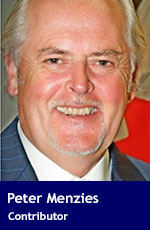 Last weekend while the National Hockey League all-star extravaganza was taking place in Tampa Bay, hundreds of thousands of people there with no interest whatsoever in hockey partied hard at the Gasparilla Pirate Festival.
Last weekend while the National Hockey League all-star extravaganza was taking place in Tampa Bay, hundreds of thousands of people there with no interest whatsoever in hockey partied hard at the Gasparilla Pirate Festival.
It doesn’t really matter that throughout history, high seas pirates – who continue to flourish – are most often psychopathic mass murderers and rapists. They are portrayed and celebrated in popular culture a la Johnny Depp’s Capt. Jack Sparrow as swashbuckling, rugged and romantic individualists living outside the boundaries of the law and convention. Free spirits and all that.
So it is with the Internet. It doesn’t matter that people who steal, distribute and access illegal content, increasingly available through ‘pirate’ set-top boxes accessing streams of ‘free’ content, are plundering booty not from the King of Spain but from artists, writers and others (yes, your Internet provider, too). The same mythology celebrated last weekend in Florida persists within web culture.
But let’s be clear: real romantic rugged individualists are self-reliant people who don’t exist parasitically on the copyright-protected ingenuity and industry of others.
So, just as Her Majesty’s vessels have been called upon over the years to restore the rule of law to the high seas, regulators are now being pressed into service to patrol a pirate-infested Internet. And here’s the dilemma: how can this be done while preserving net neutrality – the cherished principle of a free and open web within which ideas and commerce can flow without bias?
The Canadian Radio-television and Telecommunications Commission (CRTC) was asked on Monday to do just that by a large coalition of 25 telcos, artists, unions, guilds and, well, you name it. Self-titled as FairPlay Canada, they’re asking the CRTC – a quasi-judicial administrative tribunal – to create a new independent agency, ambitiously titled the Independent Piracy Review Agency (IPRA), to rule on the legality of accused sites and, if it determines their purpose is piracy, order Internet service providers (ISPs) to block them. That body, assumedly, would be a little less quasi and somewhat more judicial.
To which net neutrality champions are likely to say: Yikes.
But how do you say no to this without saying yes, even passively, to piracy? Or do you? Yikes indeed.
Net neutrality advocates have argued that Canada has among the world’s toughest anti-piracy laws and that courts are more than sufficiently equipped to fight piracy. Almost simultaneously, however, organizations such as the International Intellectual Property Alliance have placed Canada on a watch list of 16 of the world’s most pirate-friendly nations.
FairPlay obviously believes the judicial process is doomed to become an endless game of whack-a-mole as sites regenerate offshore. The group has pointed to countries such as Australia, the United Kingdom and France, where bodies similar to the proposed IPRA function smoothly while, one assumes, respecting the principle of net neutrality.
And most ISPs, through Project Cleanfeed, have already been, over the objection of no one, blocking access to hundreds of websites since 2006 – those dedicated to the horrors of child pornography.
Section 36 of the Telecommunications Act makes it clear no ISP can control the content or influence “the meaning or purpose” of transmitted content without permission of the CRTC. That means the latter has the legal tools to build the regulatory infrastructure requested should it wish to do so. Complicating matters, however, is the government’s avowed and oft-stated loyalty to net neutrality, along with its reviews of the Copyright Act and outdated broadcasting and telecom legislation. To which the average citizen likely responds by nodding off.
Don’t. You live at a time when every decision about the Internet will have consequences – good, bad and ugly – in the development of civilization. I have no idea how the CRTC – where some likely swallowed hard and reached for the Gravol after reading the coalition’s application – will or should navigate its way through the tempest before it.
FairPlay deserves credit for bringing the issue forward in a manner in which it can’t be ignored and placing it squarely at the helm of Canadian telecom policy. Steady hands will be needed on the tiller.
Peter Menzies is a former newspaper publisher who spent 10 years as a CRTC commissioner.
The views, opinions and positions expressed by columnists and contributors are the author’s alone. They do not inherently or expressly reflect the views, opinions and/or positions of our publication.

